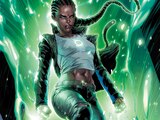All throughout Pride Month, we’ve been celebrating DC’s greatest LGBTQIA+ characters. However, we couldn’t let the month end without paying tribute to one of the most important—Maggie Sawyer. She might not have the name recognition of more recent queer characters like Batwoman, Harley Quinn, Jon Kent or Tim Drake, but don’t underestimate Maggie’s importance. Maggie Sawyer was an early trailblazer for LGBTQIA+ characters in the DC Universe. In essence, Maggie walked so that characters like Batwoman could run.
Readers first met Maggie Sawyer in 1986’s Superman #4. She was introduced as a police captain working in the Metropolis Special Crimes Unit. This position frequently paired her up with Superman, who respected the tough captain. In 1988’s Superman #15, readers were given a peak at Maggie Sawyer’s personal life. When her daughter Jamie goes missing, Maggie tells Superman about her failed marriage, and how she lost custody of her child.
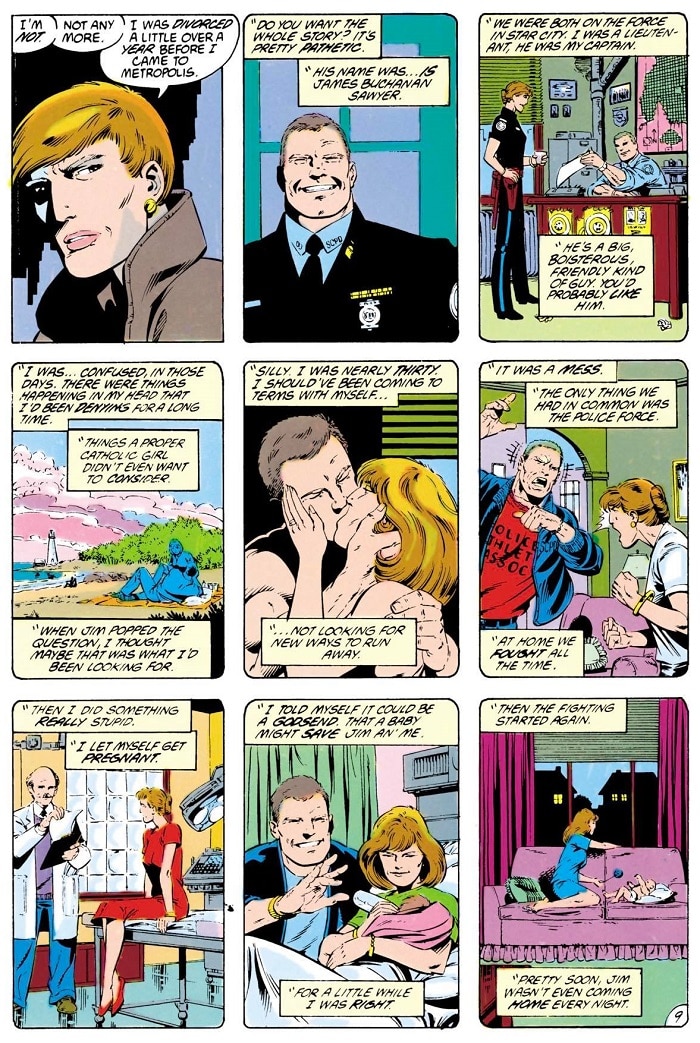
While Maggie’s flashback doesn’t explicitly spell it out, readers were able to read between the lines and figure out her sexuality.
“I was confused in those days,” she tells Superman. “There were things happening in my head that I’d been denying for a long time. Things a proper Catholic girl didn’t even want to consider.”
Maggie explains that after her marriage collapsed, she lost custody of her daughter because she wasn’t a “fit mother.”
It's important to put this in the context of the time period. In 1988, it was extremely rare to see a mainstream superhero title like Superman address homosexuality in this way. Conversely, it’s interesting to see how vague DC had to be only 33 years ago. It really makes you appreciate how far we’ve come when you compare Superman #15 to something like this year’s DC Pride special. It’s also a heartbreaking reminder of what life was—and still often is—like for queer parents.
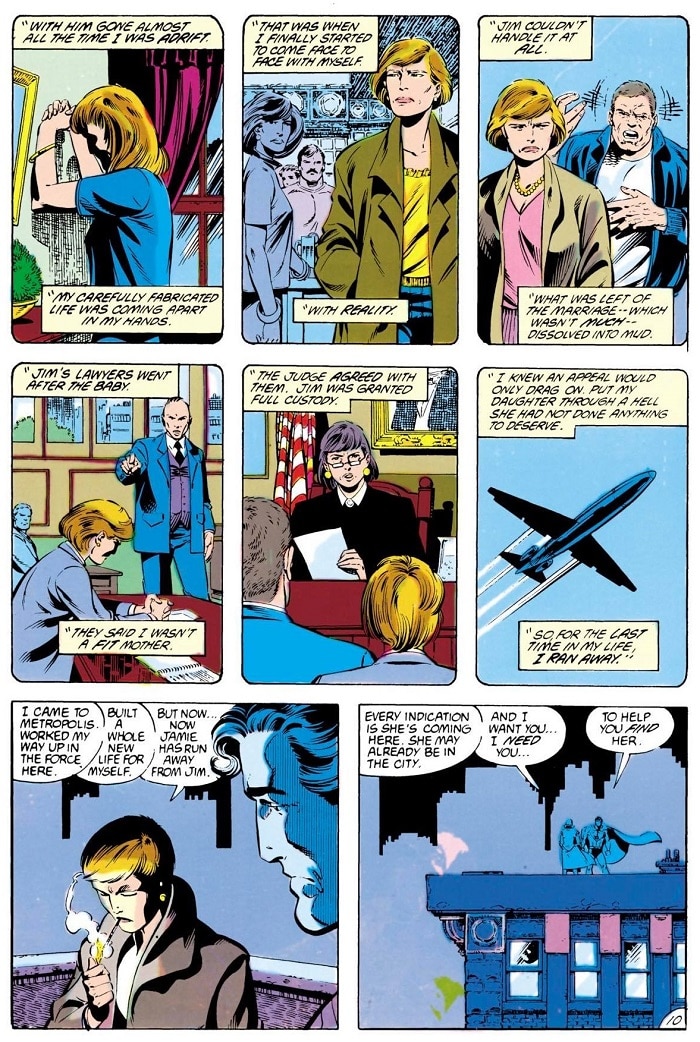
Maggie lost custody of her daughter because a judge thought her sexuality made her an unfit parent, setting up an extremely bittersweet ending for the story. Superman and Maggie ultimately save Jamie from a villain called Skyhook, but Maggie’s ex-husband James is still unwilling to give her visitation rights.
Maggie’s sexuality was weaponized against her once again in Action Comics #600. Captain Sawyer’s investigations had been getting too close to Lex Luthor’s operations, so the business mogul decided to take some counter measures. Luthor calls Maggie to his office and threatens to release a dossier containing her most personal secrets. Once again, the dialogue doesn’t explicitly state what’s in the dossier, but readers were able to put together that Lex is blackmailing Maggie over her sexuality.
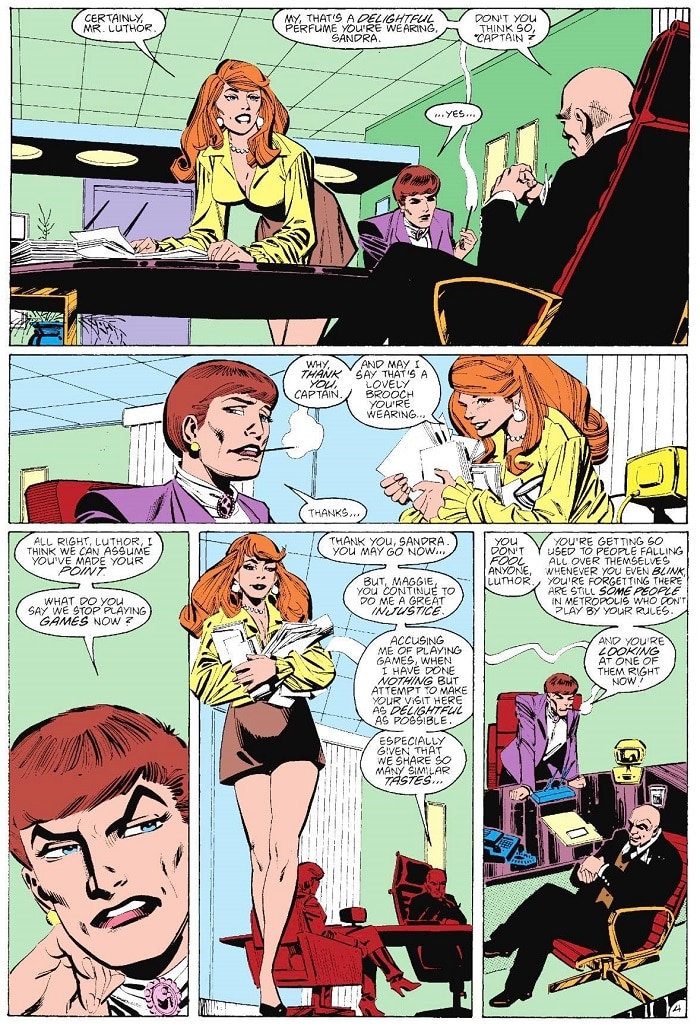
When Lex experiences a medical emergency, Maggie is left alone with the dossier. In that moment, she’s tempted to destroy it in order to preserve her secrets, but ultimately decides that would solve nothing. She later recounts the experience to her partner Dan Turpin: “I fought hard to get where I am. If Lex Luthor thinks I’m going to tuck my tail between my legs and run just because he now holds what he thinks is his big trump, he’s misjudged his target.”
Maggie continued serving as an important member of Superman’s supporting cast throughout the Post-Crisis era. In 1994, she starred in a four-issue limited series called Metropolis SCU. The comic pits Maggie against an eco-terrorist while detailing some of the struggles in her private life. In particular, we see Maggie struggle to maintain her complicated relationship with Toby Raynes, a female reporter for the Metropolis Star. The nature of their careers gives their relationship some challenges as Toby and Maggie try to avoid crossing any ethical lines. Maggie’s ex-husband James also visits, throwing additional complications into the mix. Metropolis SCU was the first limited series to feature a lesbian as the leading character. It was recognized with a GLAAD Award for Outstanding Comic Book in 1996.
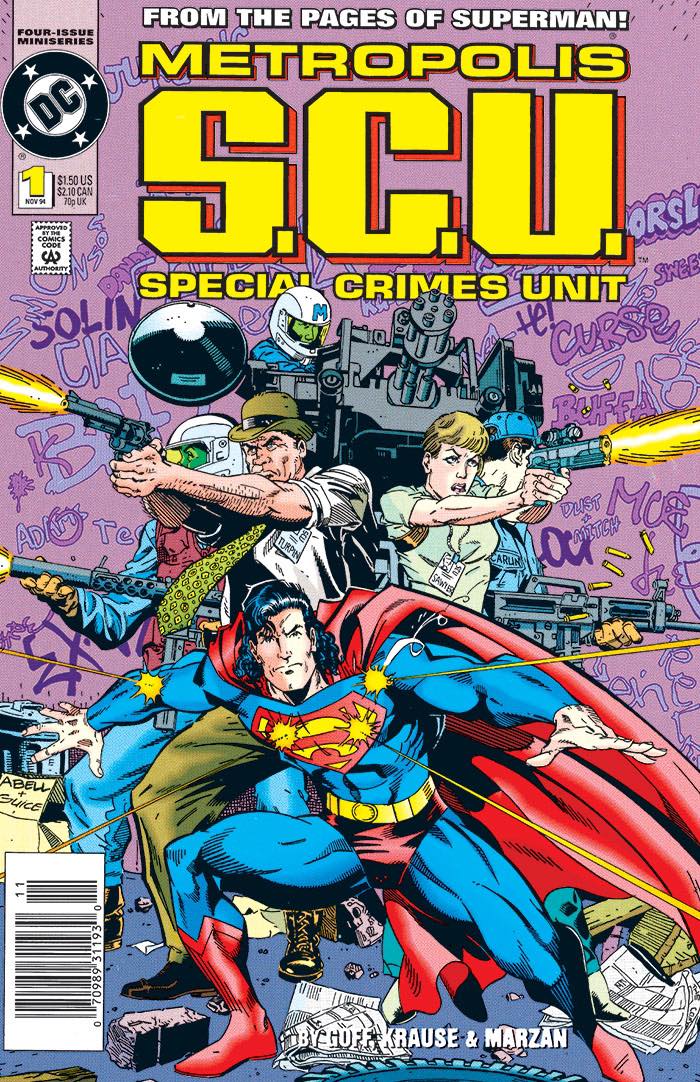
Maggie Sawyer was also an early pioneer for queer representation in western animation. She was a recurring character on Superman: The Animated Series, where she was voiced by Joanna Cassidy. During the “Apokolips…Now!” two-parter, Maggie is hospitalized and Toby Raynes is seen at her bedside. Toby and Maggie hold hands and are genuinely affectionate with one another, but the show never explicitly defines their relationship. In the episode commentaries, executive producer Bruce Timm reveals that this was their way of incorporating the relationship into the show.
Maggie’s scenes with Toby may have been minor, but at the time, they were one of the only examples of lesbianism on a superhero animated series. (Fortunately, things have progressed and today queerness is much better represented in animation, with shows like Steven Universe, The Owl House and DC’s own Young Justice leading the charge.)
Maggie also played a big role in seasons two and three of The CW’s Supergirl, where she was portrayed by Floriana Lima. Compared to Maggie’s earlier small screen appearance, Supergirl had the freedom to be more overt about Maggie’s sexuality. Over her first season, Maggie fostered a romantic relationship with Alex Danvers, Supergirl’s adoptive sister. Maggie helped Alex come to terms with her sexuality in a storyline that won the hearts of viewers and critics at the time. One of Maggie’s most memorable moments occurred in the episode “Far From the Tree” where she stood up to her homophobic father.

As I look through the various variant covers for DC Pride 2022, I see many iconic queer characters, but not Maggie Sawyer. This may sound like a weird takeaway, so bear with me, but I think that’s a testament to her legacy and how far we’ve come. When Maggie’s backstory was revealed in 1988, the script couldn’t be too explicit about her sexuality. When Metropolis SCU was published in 1994, it was DC’s first title to feature a lesbian as the lead character. Today, DC has enough out-and-proud queer characters to fill a 100-page anthology. Maggie may not be on the cover alongside them, but if it wasn’t for the barriers she helped break, these characters and the DC Pride anthology they’re all now a part of may not have ever existed. That’s a legacy worthy of pride.
Joshua Lapin-Bertone writes about TV, movies and comics for DCComics.com and writes our monthly Batman column, "Gotham Gazette." Follow him on Twitter at @TBUJosh.
NOTE: The views and opinions expressed in this feature are solely those of Joshua Lapin-Bertone and do not necessarily reflect those of DC Entertainment or Warner Bros.














